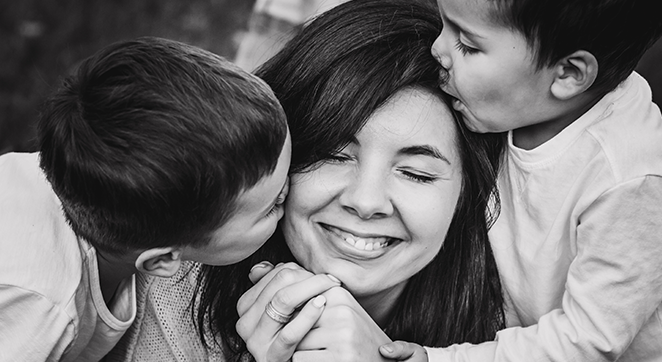What is parental alienation?
Written by SAFE
Stacey was married for 19 years when she decided to leave her husband Frank. Over the years, Frank had become increasingly controlling and physically violent. And then, not long after they separated, Frank claimed he was the victim of parental alienation.
Parental alienation is the accusation that one parent is attempting to distance a child from the other parent by negatively influencing the child’s relationship or opinion about that other parent. In relationships involving domestic violence, often times the person who used violence is the culprit of parental alienation. In many other instances, claims of parental alienation have become a way for those who use violence to continue the cycle of power and control.
When Stacey tried to get a job after her youngest son went to kindergarten, Frank began showing up at her job daily and harassing her about talking to male customers.
Stacey ended the relationship after Frank installed video cameras inside the house. In an attempt to have a civil break up, Stacey agreed to share custody 50/50 with Frank and, though the drop offs were tense, their two sons were able to move between the two parents without incident for a few months.
One night while Stacey had the boys, Frank called and said he was outside her apartment. Stacey and Frank got into an argument that ended with Frank strangling her in front of the boys. Frank left and Stacey was unsure what to do. She ultimately brought the boys to the exchange location on Sunday as per the custody order, but she told her lawyer about the incident.
During the next custody hearing, Frank’s lawyer said that Stacey was alienating the boys from their father by telling them lies about Frank’s behavior. The lawyer claimed Stacey had told the boys that Frank was violent with her. The boys had come back from their visit with mom upset, crying, and saying they did not want to be alone with their father, and wanted to be returned to their mom’s house.
In the United States, more than 10 million adults experience domestic violence annually. If a parent is abusive to their child and/or the other parent, this can cause a strain in the relationship leading to the child’s desire not to have much contact with that parent. Instead of the abusive parent realizing their part in the severance of the parent-child relationship, they choose to hold the survivor accountable.
A study from George Washington University found that when mothers reported abuse, the mothers lost custody 28 percent of the time. But when fathers alleged abuse, the fathers lost custody only 12 percent of the time. The study also found that when fathers claim parental alienation, courts are more than twice as likely to disbelieve mothers’ claims of abuse than if the father made no parental alienation claim.
A parent like Stacey who is in a high-conflict custody case with a history of domestic violence is often placed in a complex crossroad. They are asked to put their experience with their partner aside and often the children are asked to put the violence they saw, heard, or were part of to the side so that a custody agreement can be in place and adhered too. Custody orders are imperative for survivors to follow, but survivors are all too aware of the capacity of the partner who has used abuse to continue to use that abuse in new and dynamics ways. Now the survivor is no longer able to use in-person tactics to decrease the level of danger to their children during visits with the abusive parent.
Additionally, when children are no longer living under the intense eye of a parent who uses abuse, they may feel comfortable enough to process some of their experiences. They may open up to the safe parent regarding what it was like to be in the house, the violence they witnessed or heard, or what the abusive partner said about the safe partner when they were not around.
Children struggle to follow the complex custody process, which confounds many adults. Children may be confused about why they are unable to stay with the safe parent or why they must spend time with the unsafe parent alone. They may speak up, believing that if the adults only knew what the abusive parent was like, then they would change the custody agreement.
Parental alienation is a complex issue and it is important that advocates for children and survivors understand the difference between parental alienation and protective parenting.
Protective parenting is the means by which a safe parent prevents harm coming to their children, provides emotional openness and readiness to process experiences with their children, and a parent who is willing to put the needs of their children above their own. If these goals go against a standard custody agreement, we must ask two questions: Why are we separating the violence against a parent with the potential violence against children? And how do we assess for protective parenting and continued attempts to exert control over a safe partner?
References
Black, M.C., Basile, K.C., Breiding, M.J., Smith, S.G., Walters, M.L., Merrick, M.T.,. 2011. The National Intimate Partner and Sexual: 2010 Summary Report. Atlanta, GA: National Center for Injury Prevention and Control, Centers for Disease Control and Preventio.
Meier, Joan S. and Dickson, Sean and O’Sullivan, Chris and Rosen, Leora and Hayes, Jeffrey, Child Custody Outcomes in Cases Involving Parental Alienation and Abuse Allegations (2019). GWU Law School Public Law Research Paper No. 2019-56, GWU Legal Studies Research Paper No. 2019-56, Available at SSRN: https://ssrn.com/abstract=3448062 or http://dx.doi.org/10.2139/ssrn.3448062
National Coalition Against Domestic Violence (2020). Domestic violence. Retrieved from https://assets.speakcdn.com/assets/2497/domestic_violence-2020080709350855.pdf?1596811079991.